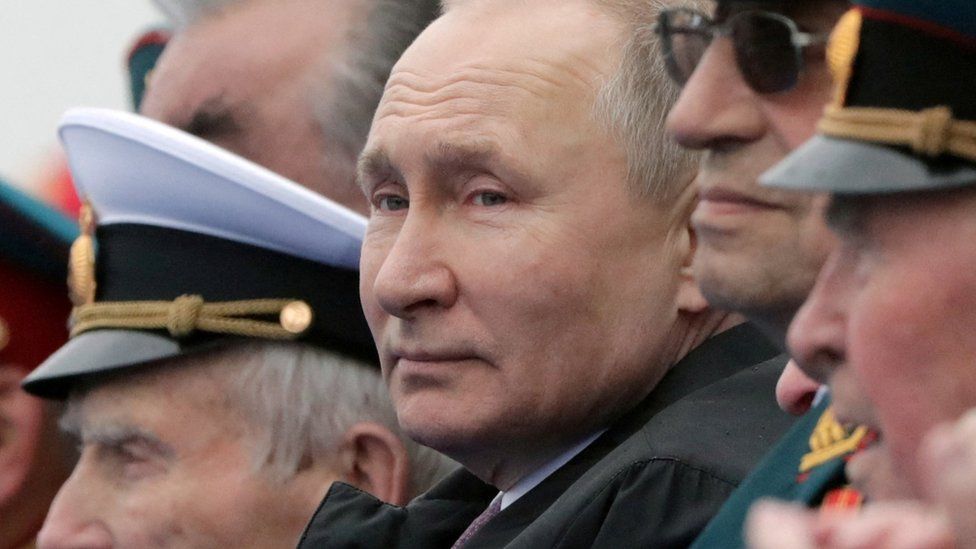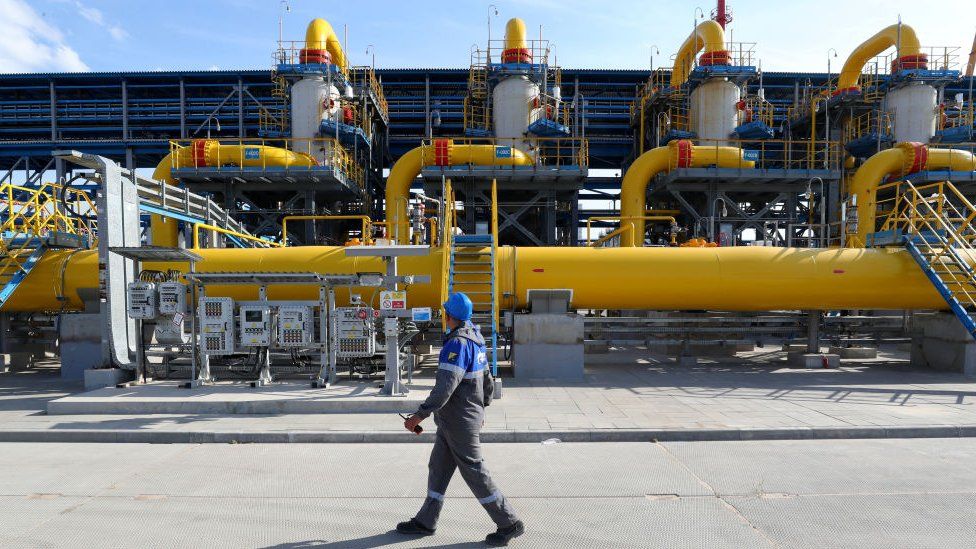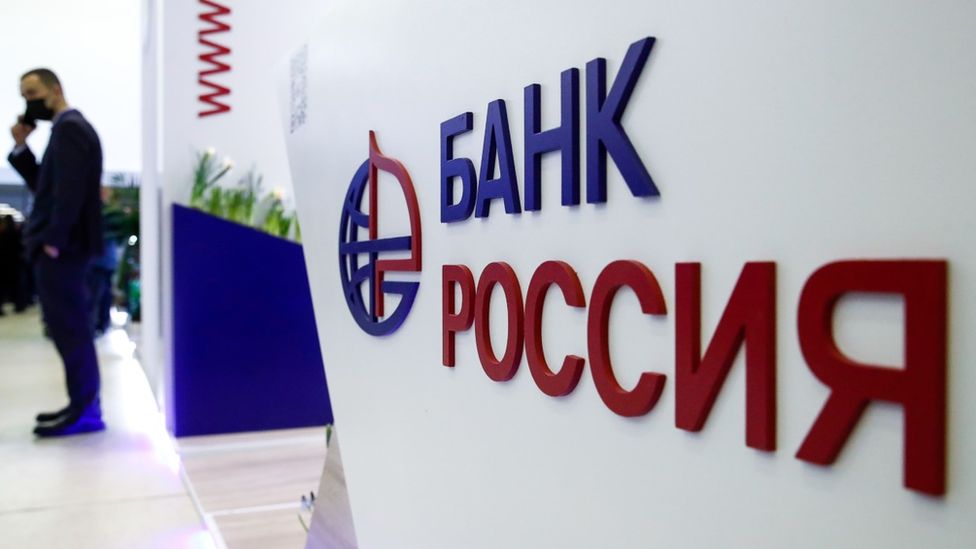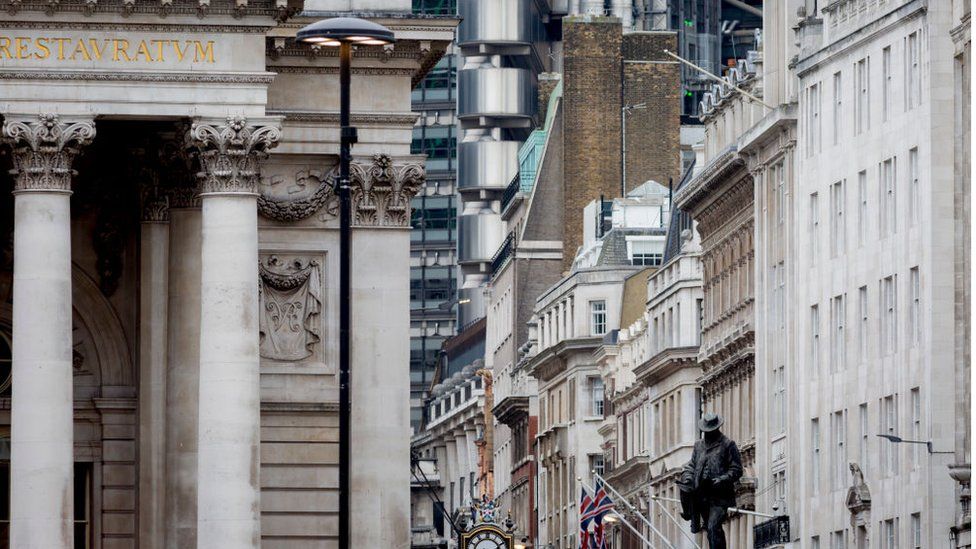The US, UK and some of their allies have imposed sanctions on Russia, in response to moves which they say lay the ground for an invasion of Ukraine.
Russian president Vladimir Putin has recognised the rebel-held areas of Donetsk and Luhansk as separate from Ukraine. It has ordered troops there, but says they have not yet been deployed.
- Why is Putin ordering troops into Ukraine?
- Putin's Ukraine statement fact-checked
What is a sanction?
A sanction is a penalty imposed by one country against another, often in order to stop it acting aggressively or breaking international law.
Sanctions are often designed to hurt a country's economy, or the finances of individual citizens such as leading politicians. They can include travel bans and arms embargoes.
They are among the toughest measures nations can use, short of going to war.
What sanctions have been imposed so far?
US sanctions announced on Tuesday are intended to hurt Russia's ability to finance its military efforts:
- two state-owned banks - which the US says are key to Russia's defence sector - will no longer be able to do business in the US or access its financial system
- five people described as part of Putin's inner circle have been sanctioned
- restrictions have been placed on US deals involving Russia's national debt
- Americans are now banned from doing business in Luhansk and Donetsk
Few US firms are active in the regions involved. But the White House said it could impose wider sanctions "should Russia further invade Ukraine".
The European Union is sanctioning 27 Russian individuals and organisations, including banks. It is also limiting access to European capital markets — cutting off the ability to access funds from EU banks - and banning trade between the EU and the two rebel-held regions.
Some 351 members of Russia's Duma, parliament's lower house, are also being targeted with sanctions.
German chancellor Olaf Scholz has put on hold permission for the Nord Stream 2 gas pipeline from Russia to Germany to open.
Meanwhile, UK Prime Minister Boris Johnson announced sanctions against five Russian banks and three wealthy Russian businessmen, and threatened further moves.
However, some MPs said the government should have been tougher - targeting more banks and individuals.
- UK ready to escalate Russia sanctions, says Truss
- Russia's plan to fight back against new sanctions
- Uefa likely to move final from Russia
What other sanctions could Russia face?
Western nations have threatened Russia with further harsh sanctions if it continues its aggression towards Ukraine.
Excluding Russia from Swift
One measure would be to exclude Russia from the global financial messaging service Swift, which is used by thousands of financial institutions worldwide.
This would make it very hard for Russian banks to do business overseas, but it would also have an economic cost for countries like the US and Germany, whose banks have close links with Russia.
The White House says it is unlikely to do this as an immediate response to an invasion.
Banning Russia from using the US dollar
The US could ban Russia from financial transactions involving US dollars. Any Western firm that allowed a Russian institution to deal in dollars would face penalties.
This could have a huge impact on Russia's economy as most of its oil and gas sales are settled in dollars. It could cripple Russia's foreign trade in other sectors.
On the other hand, Russia's oil and gas exports would slump, and that would affect European countries which are dependent on Russian gas.
Blocking banks
The US could blacklist Russian banks, making it almost impossible for them to conduct international transactions.
Moscow would have to bail out the banks and do what it could to avoid inflation rising and incomes falling.
However, this would hurt western investors with money in those banks.
Besides, Russia has reserves of over $630bn (£464bn) in its central bank to guard against such economic shocks.
Blocking the export of hi-tech materials to Russia
The West could restrict the export of key hi-tech commodities to Russia.
The US, for example, could stop companies selling goods such as semiconductor microchips. These are used in everything from cars to smartphones.
This would affect not just Russia's defence and aerospace sectors, but whole swathes of its economy, although it would also hurt Western companies that sell the technology.
Energy restrictions
Russia's economy is hugely dependent on selling gas and oil overseas and Western nations could refuse to buy oil and gas from the big Russian energy giants such as Gazprom or Rosneft.
Again, however, this could bring higher gas prices and fuel shortages to Europe. Germany, for example, relies on Russia for one-third of its gas supplies.
Limiting Russian access to London's financial institutions
Such is the scale of Russian money in banks and property in the UK that the capital has been dubbed "Londongrad".
The UK government claims it is tackling this problem with "unexplained wealth orders", which require people to say where their cash has come from.
But only a handful of these orders have ever been used.
- How much Russian money is there in the UK?
Difficulties for the West
Western countries have coordinated plans for severe sanctions if Russia launches an all-out invasion of Ukraine.
But US and European diplomats say Western countries are less united in how to respond if the invasion happens in small steps.
Some countries which have closer relations with Russia - such as Hungary, Italy, and Austria - may be unwilling to trigger major sanctions.




